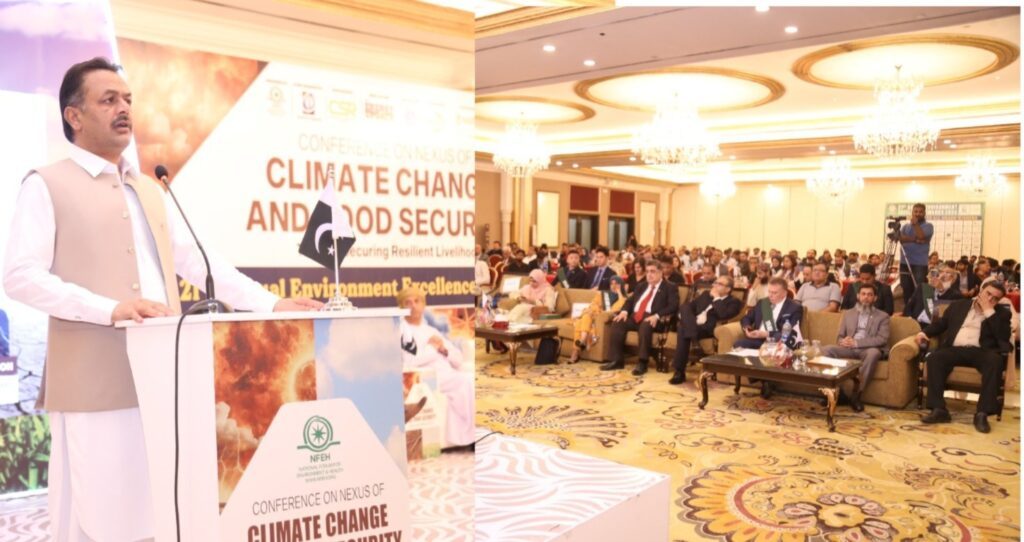
KARACHI: Sindh Environment Minister Dost Muhammad Rahimoon has highlighted the significant threats to Pakistan’s food security posed by the rapid conversion of farmlands near urban centers into gated housing societies. Speaking as the chief guest at a conference organized by the National Forum for Environment and Health (NFEH) on the impact of climate change on food security, Rahimoon underscored the detrimental effects of the 2022 floods, which severely impacted Sindh’s economy and farming sectors.
He emphasized the Sindh government’s commitment to addressing climate change through extensive mangrove plantation on the coastal belt and reducing reliance on fossil fuels. Rahimoon reassured the audience of the government’s resolve to hold accountable those violating environmental laws and invited civil society members to collaborate in enhancing environmental conditions by upholding relevant laws. Consul General of the United Arab Emirates, Bakheet Ateeq Al-Rumaithi, also spoke at the conference, stressing the importance of consulting local communities before initiating development projects to avoid blocking natural drainage paths. He suggested incorporating climate change and environmental protection topics into school curricula in an engaging manner and highlighted the potential for marketing Pakistan’s traditional organic food products internationally.
Consul General of Oman, Sami Abdullah Salim Al Khanjari, acknowledged the global challenge of food security exacerbated by climate change. He shared insights on Oman’s Vision-2040, focusing on renewable energy and carbon neutrality, and emphasized the strengthening of Oman-Pakistan relations in the agricultural sector. Al Khanjari commended Karachi’s plantation initiatives aimed at restoring the city’s green cover.
Former Sindh Agriculture Secretary Abdul Rahim Soomro pointed out that rising population pressures threaten Pakistan’s food security. He advocated for the devolution of environmental, climate change, agriculture, and food security issues to provincial governments and the use of advanced technology to boost crop yields. Soomro also called for the release of promised funds for constructing effluent treatment plants in Karachi to prevent untreated industrial waste from contaminating the sea.
Former Sindh Forests and Wildlife Secretary Shamsul Haq Memon urged urgent action to mitigate environmental degradation, given Pakistan’s high vulnerability to climate change. Dr. Zubala Yasir Lutfi from the University of Karachi highlighted the adverse effects of industrial effluents on crop cultivation. NFEH President Naeem Qureshi expressed concern over the significant amount of food waste in Pakistan, which he said could otherwise feed a large portion of the population living below the poverty line. Ruqiya Naeem, NFEH General Secretary, announced that the NGO would continue hosting dialogues to address environmental degradation.
During the event, the Sindh Environment Minister, along with the UAE and Oman Consuls General, conferred the Annual Environment Excellence awards on over 80 companies and industrial establishments recognized for their contributions to environmental protection.
#SindhEnvironmentMinister, #DostMuhammadRahimoon, #FoodSecurity, #ClimateChange, #UrbanDevelopment, #EnvironmentalProtection, #MangrovePlantation, #FossilFuels, #UAEConsulGeneral, #OmanConsulGeneral, #PakistanAgriculture, #GreenCover, #EffluentTreatment, #FoodWaste, #NFEHConference, #AnnualEnvironmentExcellenceAwards,



